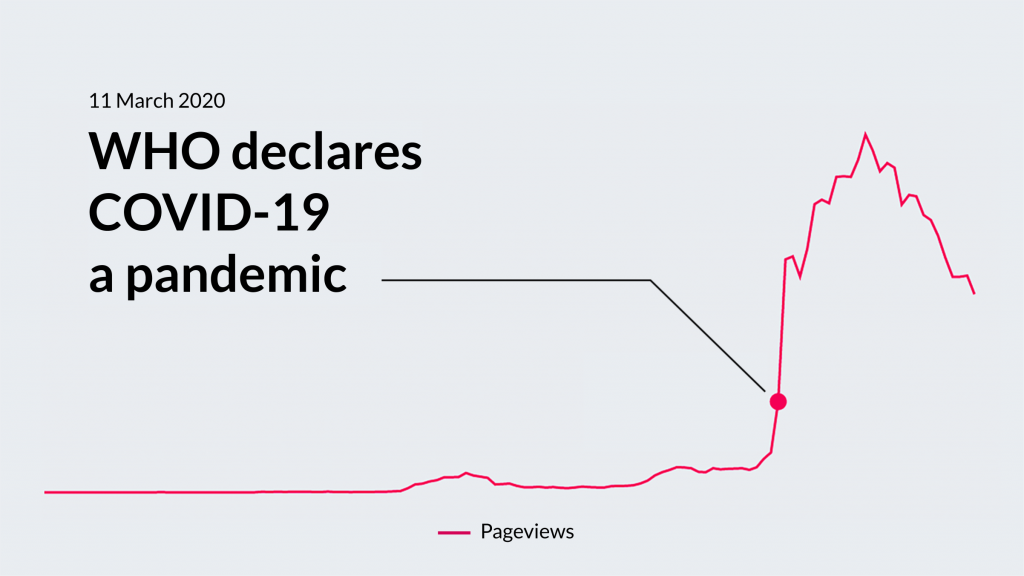Everything that happens in the world happens on Wikipedia. And when things happen, we know the world looks our way for clear, neutral, and reliable information.
We honor this responsibility every day, and its importance has only been amplified by the unprecedented global COVID-19 pandemic. In this challenging time, our utmost priority has been and will continue to be keeping Wikipedia online and available for the world.
Wikipedia will be there for students who are learning at home, people who are sheltering in place, and anyone who needs a trusted source of unbiased information. Throughout these troubling times, knowledge must and will remain open for all.
Sharing facts about COVID-19 with the world
We believe knowledge is a human right. People need equitable access to trustworthy, reliable information more than ever. Thanks to the hard work of our network of volunteers around the world, more than 6,900 Wikipedia articles about the pandemic have been created in 188 languages. These articles have been visited more than 579 million times.
Explore and use more publicly-available data about Wikipedia articles on COVID-19.
Wikimedia community resources
We are nothing without our global community of volunteers, who are working tirelessly to update articles about COVID-19, prevent the spread of misinformation on the pandemic, and translate content to make information accessible for everyone.
To ensure the safety of our volunteers and to promote public health, we have cancelled our public events through September 15 and asked all grantees to cancel or postpone planned conferences until the WHO declares the pandemic over.
We encourage volunteers and grantees looking for support, additional information, or ways to participate in COVID-19 efforts happening on Wikimedia projects to visit this Meta-Wiki page.
Supporting virtual education
Over 90 percent of the world’s student population has been affected by school closures from the pandemic, according to UNESCO estimates. As the nonprofit that operates the world’s largest encyclopedia, we have a commitment to knowledge and believe that learning must continue even if school curriculums do not.
In light of COVID-19, we have made available several free resources for at-home learners using Wikipedia and other Wikimedia projects, including lesson plans, “#EduWiki Challenge” exercises, and worksheet templates.
Additionally, we have joined UNESCO’s Global Education Coalition to support students, teachers, and governments with digital learning resources during the pandemic. We are also working with volunteers to collect information about the pandemic’s impact on education.
Putting people first
A world that is changing requires changing how we work. Since the onset of this pandemic, we have taken steps to support our staff, volunteer communities, and general public health. As part of these actions, we have:
- Closed both Foundation offices in San Francisco and Washington, DC, until at least June 30, 2021. All staff are now working remotely.
- Shifted to a reduced work week. Expectations are that staff and contractors may work 20 hours a week if necessary, and all will be paid according to their usual work schedules.
- Waived normal sick time requirements for employees who are ill or caring for others.
- Guaranteed all contract and hourly workers full compensation for planned hours worked.
- Cancelled all near-term, in-person gatherings until at least September 15, 2020.
- Provided a one-time stipend of net US$600 USD to all staff and contractors to help offset costs associated with working from home.
Our CEO Katherine Maher shares our full COVID-19 response strategy here. We encourage other organizations to take similar bold actions to prevent further harm.
Collaborate and connect with us
- Use our data: Data from Wikimedia projects are open to anyone and are already being used by entities such as Google, Mozilla, and governments to share information about the pandemic. Please contact us at partnerships@wikimedia.org if you need support using our data or would like to collaborate.
- Follow us: See our news and updates by following the Wikimedia Foundation on Facebook, Twitter, Instagram, and LinkedIn.
- Media inquiries: Please contact press@wikimedia.org.
Support our work
Wikipedia is providing unbiased, reliable, and vital information about the COVID-19 pandemic to millions of people around the world. In this challenging time, your donation supports the people, projects, and technology behind this work and protects the right to free and open knowledge for everyone. We ask you, humbly, to help.
Related news
- WIRED: “How Wikipedia Prevents the Spread of Coronavirus Misinformation” (March 15, 2020)
- The Washington Post: “Wikimedia’s approach to coronavirus: Staffers can work 20 hours a week, get paid for full time” (March 17, 2020)
- Forbes: Like Zika, The Public Is Heading To Wikipedia During The COVID-19 Coronavirus Pandemic (March 18, 2020)
- Slate: “The Coronavirus Is Stress-Testing Wikipedia’s Policies” (March 19, 2020)
- Daily Dot: “Meet the Wikipedia editors fighting to keep coronavirus pages accurate” (March 24, 2020)
- India Times: “How Indians Are Making A Difference In Wikipedia's Fight On Coronavirus Misinformation” (March 29, 2020)

Help us unlock the world’s knowledge.
As a nonprofit, Wikipedia and our related free knowledge projects are powered primarily through donations.
Contact us
Follow
Photo credits
National Institute of Allergy and Infectious Diseases (NIAID)
